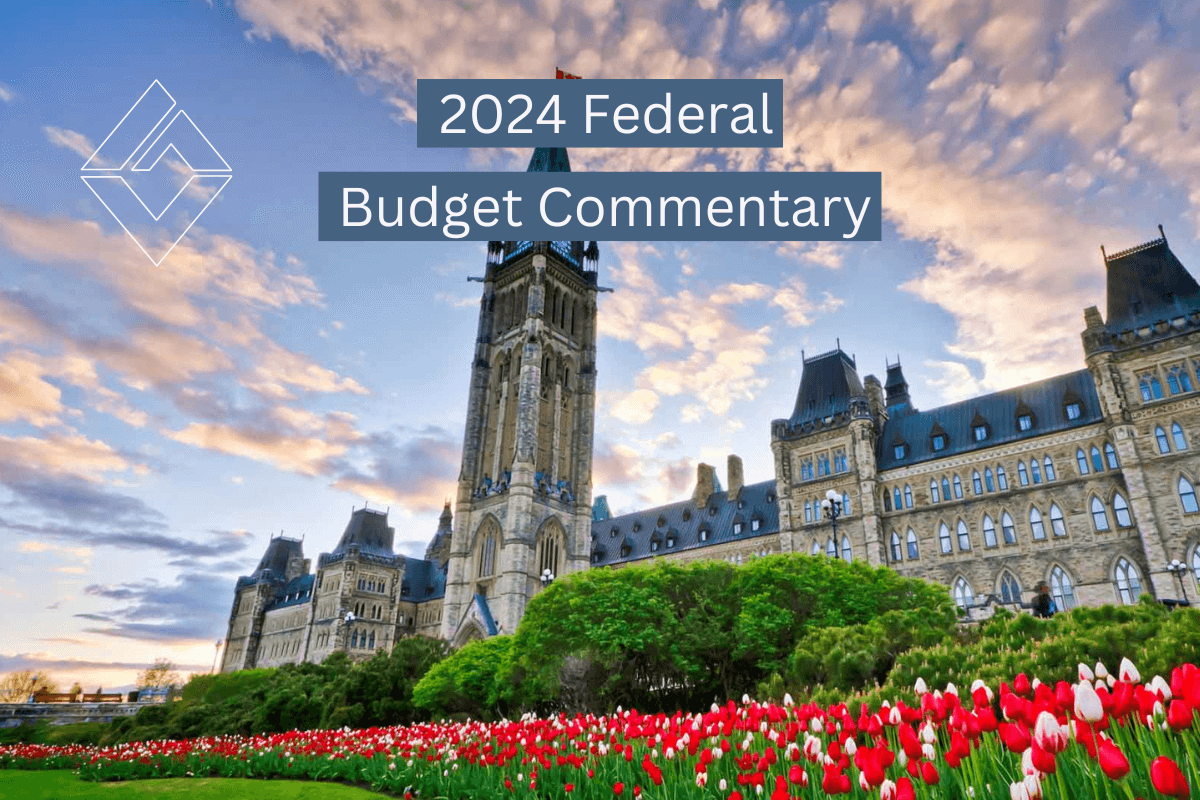On April 16, 2024, the Department of Finance released the 2024-25 Federal Budget with an emphasis on affordability – in general and specifically in housing.
We’ve summarized the largest tax and benefit announcements below and will provide additional information as further details and clarity are released.
Major Changes in Tax Rules & Incentives
Capital gain inclusion rate increased
- Who is affected:
- Corporations and trusts (all capital gains)
- Individuals who realized capital gains over $250,000 annually
- What is changing: The inclusion rate is changing from 50% to 66.67%; capital gains up to the $250,000 threshold will remain at 50% inclusion rate for individuals
- Effective Date: Applies to capital gains realized June 25, 2024 and later (capital gains realized before June 25, 2024 remain at 50% inclusion rate regardless of amount)
Capital Gains Exemption maximum increased to $1,250,000
- What is changing: Maximum lifetime claim increases from $1,016,836 to $1,250,000
- Effective Date: Effective for gains realized June 25, 2024 and later
- Maximum will have indexed increases beginning in 2026
Canadian Entrepreneurs’ Incentive introduced to reduce tax rate on qualifying sale of shares
- What is the benefit:
- Reduces applicable capital gain inclusion rate by half on eligible sales
- Applies to sales of qualifying active corporation shares that have been held by the seller since the corporation was founded, held for at least five years, and represent at least 10% of total corporate votes and value
- Effective Date: Initial $200,000 limit available on January 1, 2025, increasing $200,000 per year until 2034
- Qualifications: Maximum lifetime claim of $2,000,000 of qualifying gain per individual, in addition to their lifetime capital gains exemption
- Not available for professional corporations and in certain industries
Housing Affordability & Construction
Home Buyers’ Plan expanded
- What is changing: Maximum individual withdrawal increased to $60,000 from $35,000
- Repayment period: 15 year repayment period begins 5 years after initial withdrawal for withdrawals made January 1, 2022 to December 31, 2025, extended from traditional 2 years
Purpose-built rental housing incentives
- What is changing:
- Increased capital cost allowance depreciation rate to 10% from 4%
- Property must have minimum of 4 private apartments or 10 private rooms/suites per building, and minimum of 90% of units held for long-term (12+ months) rental
- What qualifies: Conversion of non-residential buildings, or addition to existing buildings could qualify, but renovation of existing buildings would not
- Effective date: Applies to new construction beginning on or after April 16, 2024 and before January 1, 2031, and available for use before January 1, 2036
- Other details:
- Expanded ability to deduct interest and financing expenses for arm’s length borrowing to build or acquire qualifying properties
- Applies to corporate year ends starting October 1, 2023 and later
Supporting Small Businesses
Immediate expensing of “productivity enhancing” assets
- What is changing:
- Broad categories of assets – patents and use of patented information, data network infrastructure and related softwares, and general-purpose electronic data processing equipment and related softwares – will be deductible at 100% rate in year of purchase
- New and used assets can qualify, unless acquired from a non-arm’s length party, or on a tax-deferred “rollover” basis
- Effective date: Applies to acquisitions on or after April 16, 2024, and available for use before Jan 1, 2027
Canada Carbon Rebate for Small Business introduced
- What is it:
- Provides rebate to Canadian Controlled Private Corporations based on number of employees in prior calendar year
- Rate per employee based on location of employees and provincial fuel charge collected
- 2019 – 2024 fuel charge year rebates will be available to CCPCs who have filed their 2023 corporate tax return by July 15, 2024
- Who receives it: Not available to corporations with more than 499 employees
Crackdown on Non-Compliant Taxpayers
New tool and expanded penalties available to CRA to combat non-compliance
- What is changing: A new “Notice of Non-Compliance” communication introduced that the CRA can issue that would extend the maximum time period the CRA has to reassess a taxpayer, or an individual non-arm’s length with the taxpayer, on issues related to the non-compliance notice
- What are the penalties:
- Provides a penalty of $50/day that the Notice of Non-Compliance is outstanding, to a maximum of $25,000
- New penalty on taxpayers where a Compliance Order is obtained by CRA, equal to 10% of the taxes owing for year(s) subject to the Compliance Order, if taxes owing was in excess of $50,000
Other Notable Announcements
- Mineral Exploration Investment Tax Credit – 15% ITC program extended to eligible agreements entered into on or before March 31, 2025
- Expansion of eligible expenses for Disability Support Deduction program
- Doubling Volunteer Firefighters and Volunteer Search and Rescue Tax Credits to $6,000
- Modernized and simplify Charity communications and donation receipt requirements
- Certain crypto-related businesses will be required to provide information similar to mainstream banking/financial institutions starting in 2026
- Consideration is being given to a new tax on vacant residentially-zoned land, with consultations to be launched later this year
Additional clarification and details of previously announced initiatives
- Changes to revamped Alternative Minimum Tax calculation
- Clean Electricity ITC and Clean Manufacturing Technology ITC criteria and eligibility
- Employee Ownership Trust qualifying conditions and expansion of similar rules to worker cooperative corporations
Conclusion
Many of the provisions announced in the Budget are not fully formed, and further details and legislation wording will become available in the future. Much like the additional information provided now for initiatives previously announced, future Department of Finance communication will be necessary before the full scope of these changes will be known.
We will endeavour to provide more detailed analysis when possible. Please contact your Virtus advisor with specific questions or to discuss your particular situation.


